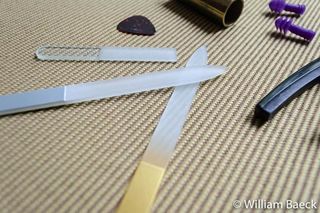Glass Nail Files (It’s All About Not Shredding)

For today’s column, I’m going full metrosexual.
Ladies and gentlemen, let’s discuss nail care. Specifically, let’s talk about files. Because the only thing that could possibly get me interested in the state of my fingernails is buying a new piece of guitar-related equipment to deal with them.
I have always hated nail files and their nasty sandpaper brethren, emery boards. Besides shredding the ends of my nails ragged, their grinding has the same effect on my nervous system as sitting through the entire Saw franchise. That’s why I’ve always used nail clippers instead, which work well enough for the fretting hand. But if you fingerpick with bare nails, getting them the right shape takes a bit more finesse than clippers provide.
The problems are that clippers tend to leave sharp edges, and they work so fast that you can’t always see what you’re doing. Plus, they’re gross—they spray clippings everywhere. And there’s nothing that says, “I’m single and here’s one more reason why” like that keratin snowstorm outlining the base of your toilet. That’s why fingerpickers tend to tough it out and use some kind of grit, file or sandpaper—it lets them shape nails and preserve relationships.
This is where glass nail files come in. I first found out about these nail- and relationship-preserving manscapers at an acoustic guitar exhibition. According to my extensive nail file research—Ha!—glass nail files were first developed in 1997 in the Czech Republic, where there’s been a cottage industry producing them ever since. The best glass files are made out of a hard, tempered glass called “Bohemian crystal” named from the region where it was first developed around the 16th century.
An important effect of the tempering process is that when you drop one of these files onto a hard surface (which you will) and the file breaks (which it will), it won’t shatter into tiny slivers but rather into chunks without sharp edges. Each side of a well-made glass nail file is acid–etched to create the appropriate roughness. I look for ones that are the equivalent of fine grit on at least one side, as I’ve never needed medium.
So let’s talk about how to use them. Unlike regular files, it doesn’t seem to matter how you file as long as you do it gently. Move the glass file side-to-side, up and down, even hold it still and move your nail across it. If, like me, you hate the nail-on-chalkboard feeling you get with regular files, file your nails under warm water. That’s the wonderful thing about glass files: they’re waterproof.
Get The Pick Newsletter
All the latest guitar news, interviews, lessons, reviews, deals and more, direct to your inbox!
The marketing copy I’ve read says that glass files don’t tear the ends of your nails the way regular files and emery boards can, and from what I’ve seen, this seems to be the case. The trick is to apply very light pressure to file and shape each nail the way you want. That’s about all there is to it. Really, if you can’t file your own nails, you probably can’t manage a G chord without help either.
Now a perfectionist such as a classical guitarist might want to use a separate buffing pad to polish their nail ends. Me, I can’t be bothered. When I’m done shapin,g I just rub my nails back and forth a couple of times on a towel or my jeans to smooth off the tips. Then to clean the file I run it under water and dry it off. With this minimal care, glass files supposedly last for years. However, I’ve never had one last more than a few months, because I always drop it eventually. At which point the bigger half goes in a gig bag to become a travel file.
Fortunately, you can buy them cheap. I generally pay around $8 to $10—about the same as a set of emery boards or a metal nail file. If you don’t find them at your local drugstore, you can get them from eBay or Amazon. Then file your nails and nail that solo.
William Baeck is a writer, photographer and hack guitarist living in London. You can check out his webpage at williambaeck.com and reach him on Facebook and Twitter.

"Upgrading from your entry-level acoustic opens the door to an entirely new world of tonewoods, body shapes, and brands": 6 signs it's time to upgrade from your first acoustic guitar

"I'm past my prime": 5 common excuses for not learning the guitar – and 5 body and mind-boosting reasons you should










